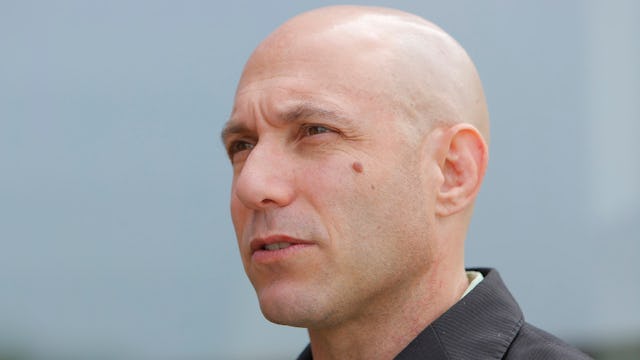Sandy Hook Father Dies By Apparent Suicide

Jeremy Richman lost his six-year-old daughter in the Sandy Hook massacre in 2012
Jeremy Richman, father of Avielle Richman, one of the first grade students killed in the massacre at Sandy Hook Elementary School, has died by apparent suicide this morning. Newtown Police confirm he was discovered in his office at Edmond Town Hall.
According to CNN, Richman was found at 7:00 am today. The 49-year-old father lost his six-year-old daughter in 2012 when a gunman took the lives of 20 first grade students and six educators. The heartbreaking shooting led to a number of Newtown parents becoming reluctant gun violence advocates, and Richman was no exception. He was a neuroscientist and co-founded with wife Jennifer Hensel The Avielle Foundation, a non-profit dedicated to bringing attention to issues of mental health using research and community engagement.
“The Avielle Foundation’s mission is two-sided. On the one side we have research. We are funding neuroscience research aimed at understanding the brain’s chemistry, structure, and circuits that lead to violence and compassion,” the site’s description reads.
In a statement, Newtown Police Lt. Aaron Bahamonde said, “This is a heart breaking event for the Richman family and the Newtown Community as a whole, the police department’s prayers are with the Richman family right now, and we ask that the family be given privacy in this most difficult time.”
They write, “The death appears to be a suicide, but police will not disclose the method or any other details of the death, only to state the death does not to appear to be suspicious.” There will be an autopsy to further determine the details of Richman’s passing.
At the time of her death, Avielle was the family’s only child. In a 2017 interview with NPR, Richman gave a heartbreaking description of life without their little girl. “It was like a ghost limb syndrome, you know, where you keep thinking ‘Where’s Avielle? Do we need to pick her up?’” he said. “And every day you’d have this [realization] that I don’t have a child, and I don’t have to parent. That was just brutal.”
The couple had two more children after losing Avielle.
News of Richman’s death comes after two Parkland survivors died by suicide. 19-year-old Sydney Aiello died last week after a struggle with post-traumatic stress disorder and survivor’s guilt, the combination of which made it hard for Aiello to attend classes as she was plagued by fear of being in a classroom setting. A second Marjory Stoneman Douglas student died over the weekend in what police are calling “an apparent suicide.” The student was reportedly a sophomore at MSD and his name hasn’t been released.
The news of Richman’s death, particularly after the deaths of the Parkland survivors, has people pouring out condolences and feelings of sadness — and shock.
It’s evident that those lost to these horrific events aren’t limited to the people killed during the massacres themselves. These violent events have continuing repercussions for the family and friends left behind who grapple with losing their loved one, their child, their best friend, in such a traumatic — and preventable — fashion. After Americans witnessed New Zealand banning weapons of war only days after a shooting that took the lives of 50 people, it’s hard not to wonder why more action isn’t being taken here to put a stop to gun violence.
No one can speak to Jeremy Richman’s thoughts before he died, but he lived through the murder of his little girl — only to spend the next six years watching it happen over and over again to other families who sent their child to school one day and never saw them again. It’s simply heartbreaking to comprehend a parent living through the horror of losing a child only to have their own government do nothing to prevent it from happening again.
If you or someone you know is considering suicide, please contact the National Suicide Prevention Lifeline at 1-800-273-TALK (8255).
This article was originally published on